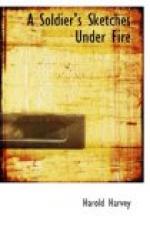A ration party consists of fourteen men—fewer sometimes, but fourteen if possible, as the proper full complement. The small carts in use are generally of rude and primitive construction. As everybody knows by now, rations comprise bully beef Spratt’s biscuits—very large and rather hard—loaves of bread packed in sacks, bacon, jam, marmalade, Maconochies in tins, and, when possible, kegs of water. Let not the rum be forgotten. No soldier is more grateful for anything than for his tablespoonful of rum at half-past six in the evening and half-past four in the morning. His “tot” has saved many a man from a chill, and kept him going during long and dreary hours of wet and press. As to bread, by the bye, it is highly probable that one small loaf, about half the size of an ordinary loaf, will be divided between seven men. With the good things already enumerated, a plentiful supply of charcoal and coke is usually to be expected. The horse transports with these provisions never get nearer than, at the closest, say half-a-mile of the front trench itself, when the men in charge dump their loads down and get away back to their stores and billets as quickly as possible. There is a lot to risk, for as a rule the enemy have the road well set, and the shelling is often very severe.
It is the duty of a ration party to bring up the loads from where they have been left. On regaining the opening to the trench, they take the rations to the quartermaster-sergeant’s hut or dug-out. The sergeants of each platoon come to this hut or dug-out, and to them the things are delivered in quantities proportionate with the number of men in the section each represents. The sergeants then send along two men to carry the whacks to the respective traverses in the trench. This goes on night after night. So on the occasion I am recalling we were very late—and the distance we had to go was as much as a mile and three-quarters.
This ration carrying, the final stage of ration transport, is an even more dangerous and risky job than the preceding stage, and, as usual, snipers got busy on us, hitting three men, though none was killed. The rattle of bullets from machine guns on the ricketty sides of the old cart added to the programme of the night’s entertainment, and there were frequent intervals, not for refreshments, but for getting flat and waiting.
GATHERING IN OUR FIREWOOD.
Chopping up firewood was regarded not so much as work as it was regarded as one of our recreations in the trenches—of which I shall have a little to say presently. But it often happened that there was no recreation, but only the excitement of danger in the night-time job of bringing in the firewood for day-time chopping. It would happen that a man had spotted in some shelled house or fallen farm-building a beam, plank, door, or something else wooden and burnable, that he couldn’t carry without assistance,




